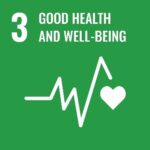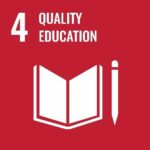Highly Cited Researchers™ are making a significant impact in sustainability research, with many doing outstanding work towards the United Nations’ Sustainability Development Goals (SDGs). As part of our ongoing blog series, we shine a spotlight on top researchers contributing to Good Health and Well-Being (SDG 3) and Quality Education (SDG 4).
The third and fourth SDGs have clear and critical aims. The Good Health and Well-Being SDG is to ensure healthy lives and promote well-being for all, at all ages. The SDG for Quality Education supports inclusive and equitable quality education and promotes lifelong learning opportunities for all. We take a closer look at the research projects in this space by focusing on the work of Highly Cited Researchers. These researchers demonstrate real citation impact, and thus provide a snapshot of the influential work taking place towards these goals.
What is a Highly Cited Researcher?
The Highly Cited Researchers recognition program is produced annually by the Institute for Scientific Information™ (ISI) at Clarivate™. The analysis is led by David Pendlebury, Head of Research Analysis, and myself, Ryan Fry, Senior Product Data Analyst.
This program recognizes scientists whose research demonstrates significant influence, seen through high citation rates of their works over the last 11 years. This recognition of exceptional scientific performance of research articles covers 21 fields (as used in the Essential Science Indicators™, or ESI, from Clarivate) and includes thousands of researchers around the world.
The 2021 list of recipients identified about 3,800 Highly Cited Researchers in the 21 fields of the sciences and social sciences, and about 2,800 Highly Cited Researchers with multiple fields.
SDG 3: Research advancing health and wellbeing
The third Sustainable Development Goal, Good Health and Well-Being, covers a wide variety of topics. Based on the United Nations website, these topics include:
- reducing maternal mortality and ending preventable deaths of newborns and children under 5 years of age
- ending the epidemics such as AIDS, tuberculosis, malaria etc.,
- strengthening the prevention and treatment of substance abuse
- reducing deaths resulting from road traffic accidents
- achieving universal health coverage
- substantially reducing the number of deaths and illnesses from hazardous chemicals and air, water and soil pollution and contamination.

The Good Health and Well-Being goal in InCites Benchmarking and Analytics™ includes over one million papers published since 2015.
The main reason for the size of the corpus is that this goal covers all areas of medical and biomedical sciences. It also includes large social sciences categories such as psychology, criminology, social work and others.
Our analysis of SDG 3 papers and the 2021 recipients of our Highly Cited Researchers program produced a list of 1,900 individuals and 10,900 Highly Cited Papers™ published in these areas. In the section below, we look at a few examples of researchers who have the most Highly Cited Papers classified as SDG 3 papers.
Highly Cited Researchers focus on cancer and diabetes studies
When it comes to SDG 3, Highly Cited Researchers are making an impact in cancer and diabetes studies.
These diseases are the most prevalent and main cause of death around the world. According to the World Health Organization (WHO), the number of people with diabetes rose from 108 million in 1980 to 422 million in 2014. WHO also shows that cancer accounted for nearly 10 million deaths in 2020, or nearly one in six deaths.
Research in these areas is critical. Indicator 3.4.1 within SDG3 specifically addresses these diseases in Target 3.4: “By 2030, reduce by one third premature mortality from non-communicable diseases through prevention and treatment and promote mental health and well-being” and, “Mortality rate attributed to cardiovascular disease, cancer, diabetes or chronic respiratory disease”.
The burden of cancer, an overview and potential treatment options
In this category we celebrate three researchers whose article provides a status report on the global burden of cancer worldwide. Their article received over 38,000 citations: Global cancer statistics 2018: GLOBOCAN estimates of incidence and mortality worldwide for 36 cancers in 185 countries.
The authors are: Dr. Ahmedin Jemal Senior Vice President, Surveillance & Health Equity Science; Dr. Rebecca Siegel Senior Scientific Director, Surveillance Research at the American Cancer Society; and Dr. Freddie Bray Branch Head of Cancer Surveillance at the World Health Organization.
“The recent global assessments of cancers attributable to infection, obesity, and ultraviolet radiation remind us of the sheer variability in their importance for different parts of the world and the need to tailor cancer control actions in accordance with localized patterns of risk factors and cancer burden profiles”.
We would also like to highlight the work of Dr. Julie R. Brahmer, Director of the Thoracic Oncology Program and Professor of Oncology at the Sidney Kimmel Comprehensive Cancer Center at Johns Hopkins.
Dr. Brahmer’s paper is a clinical study where two drugs were tested on patients to measure survival rates. Her article has received over 5,000 citations since its publication in the New England Journal of Medicine: Nivolumab versus Docetaxel in Advanced Nonsquamous Non-Small-Cell Lung Cancer.
“Despite the increased number of treatment options for Nonsquamous Non-Small-Cell Lung Cancer (NSCLC), minimal improvement in overall survival has been noted, except among patients with EGFR mutations or ALK translocations… In our phase 3 study involving patients with advanced nonsquamous NSCLC, nivolumab was associated with a significant survival benefit over docetaxel”
The diabetes epidemic and its various causes
A Highly Cited Researcher advancing diabetes research is Dr. Frank B. Hu, the Chair of the Department of Nutrition and the Fredrick J. Stare Professor of Nutrition and Epidemiology at the Harvard T.H. Chan School of Public Health, and Professor of Medicine at the Harvard Medical School.
“Type 2 diabetes is a global crisis that threatens the health and economy of all nations, particularly developing countries. This epidemic is primarily driven by rapid urbanization, nutrition transition, and increasingly sedentary lifestyles.”
Dr Hu. specializes in diet/lifestyle, metabolic, and genetic determinants of obesity, type 2 diabetes and cardiovascular diseases. His article “Globalization of diabetes: the role of diet, lifestyle, and genes” has received over 1,000 citations since its publication. In this article Dr. Hu discusses various causes that fuel the diabetes epidemic around the world including behavioral and environmental factors, including diet, exercise, pollution and more.
SDG 4: Quality Education, enhancing and supporting engagement

The fourth Sustainable Development Goal for Quality Education aims to eliminate barriers to quality education and ensure that all people will have access and equal opportunity to be educated and develop professional skills. It specifically addresses gender, social or economic disparities that might prevent access to education.
SDG 4 consists of nine main targets. Based on the United Nations website, these include:
- free primary and secondary education
- equal access to quality pre-primary education
- equal access for all women and men to affordable and quality technical, vocational, and tertiary education
- the elimination of gender disparities in education and ensure equal access to all levels of education.
How the social environment affects students’ motivation
Within the targets and goals for Quality Education, we note the work of Highly Cited Researcher, Maarten Vansteenkiste, a professor at the Department of Developmental, Personal, and Social Psychology at Ghent University.
Dr. Vansteenkiste’s work focuses on the motivation behind one’s actions and its influence on success, especially during one’s educational pursuits. He examines how the social environment, including parents, teachers, coaches and therapists, can affect people’s motivation.
His article, “Do perceived autonomy-supportive and controlling teaching relate to physical education students’ motivational experiences through unique pathways? Distinguishing between the bright and dark side of motivation”, studies the influence of autonomy-supportive teaching versus controlling teaching on students’ motivation.
“The results suggest that effective teacher training in terms of motivational style may involve more than training teachers to become more autonomy supportive toward their students; it may also involve raising awareness among teachers about the motivational risks associated with controlling practices and discouraging them from engaging in such practices.”
Dr. Vansteenkiste found that autonomy-supportive teaching supports autonomous motivation rather than defiance. This article includes recommendations for teaching styles and training to create a supportive and motivational environment for students.
Physical activity to combat obesity and illness
Highly Cited Researcher Dr. Estelle Lambert focuses on the importance of physical activity to combat obesity and illness in society with special focus on childhood habits.
Dr. Lambert is the Director at the Health through Physical Activity Lifestyle and Sport Reearch Centre (HPALS), Department of Human Biology, Faculty of Health Sciences, University of Cape Town.
Her article “The South African 24-Hour Movement Guidelines for Birth to 5 Years: An Integration of Physical Activity, Sitting Behavior, Screen Time, and Sleep” provides guidelines and particle approach to caregivers to promote heathy habits adaptation for children.
This paper was a result of close work with stakeholders as well as an in-depth scan of the literature. It is the first guideline document published for South African children in this age group from a low- and middle-income country.
These guidelines can be seen today in the form of infographics posted on social media and government sites. Following sleep and exercise guidelines from birth to five years old helps lay the foundation for children to succeed in these areas once at school.
SOUTH AFRICAN 24-HOUR MOVEMENT GUIDELINES FOR BIRTH TO FIVE YEARS.
View the latest guidelines on physical activity, sitting behaviour, screen time and sleep for children. #HAKSA2018 #movementtomove #globalmatrix pic.twitter.com/hnJPGnLDwc— SSISA (@Sportscience_sa) December 4, 2018
Stay up to date
We discussed the SDG Publishers Compact in the first post in our series and then celebrated the Highly Cited Researchers in SDG 1: No Poverty and SDG 2: Zero Hunger. You can read more about the Publishers Compact and these top authors, here.
In our next post, we will identify Highly Cited Researchers who are working to address SDG 5: Gender Equality and SDG 6: Clean Water and Sanitation.
At Clarivate, sustainability is at the heart of everything we do. Read our Corporate Sustainability commitment, or view our Sustainability eBook collection brings together 5,000 titles for research, teaching and learning.
About the authors
Ryan Fry is a Senior Product Data Analyst at the ISI. Since 2013, he has worked for Clarivate in various roles in User Experience and Technology before joining the ISI in 2019. He manages the yearly Highly Cited Researchers program and works on other bibliometric projects throughout the year.
Gali Halevi is Director at the Institute for Scientific Information. Previously she was Associate Dean of Libraries & Information Sciences at the Icahn School of Medicine at Mount Sinai and the Mount Sinai Health System. She has a background in bibliometrics and has worked in academic publishing and as an information specialist for pharmaceutical and financial companies.
ORCiD: 0000-0003-1967-4147; Web of Science ResearcherID AAD-2257-2021




